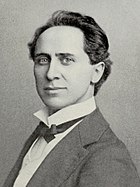
The Militia Act of 1903 (32 Stat. 775),[1] also known as the Efficiency in Militia Act of 1903 or the Dick Act, was legislation enacted by the United States Congress to create what would become the modern National Guard from a subset of the militia, and codify the circumstances under which the Guard could be federalized. It also provided federal funds to pay for equipment and training, including annual summer encampments. The new National Guard was to organize units of similar form and quality to those of the regular Army, and intended to achieve the same training, education, and readiness requirements as active duty units.[2]
- ^ "TOPN: Militia Act of 1903". cornell.edu. Retrieved August 12, 2020.
- ^ Barry M. Stentiford, The American Home Guard: The State Militia in the Twentieth Century, 2002, page 12
